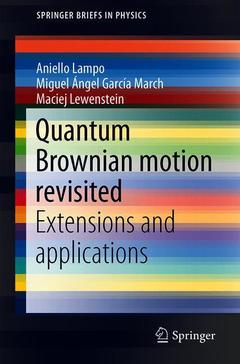Quantum Brownian Motion Revisited, 1st ed. 2019 Extensions and Applications SpringerBriefs in Physics Series
Auteurs : Lampo Aniello, García March Miguel Ángel, Lewenstein Maciej

Quantum Brownian motion represents a paradigmatic model of open quantum system, namely a system inextricably coupled to the surrounding environment. Such a model is largely used in physics, for instance in quantum foundations to approach in a quantitative manner the quantum-to-classical transition, but also for more practical purposes as the estimation of decoherence in quantum optics experiments.
This book presents the main techniques aimed to treat the dynamics of the quantum Brownian particle: Born-Markov master equation, Lindblad equation and Heisenberg equations formalism. Particular attention is given to the interaction between the particle and the bath depends non-linearly on the position of the former. This generalization corresponds to the case in which the bath is not homogeneous. An immediate application is the Bose polaron, specifically an impurity embedded in an ultracold gas.Date de parution : 05-2019
Ouvrage de 109 p.
15.5x23.5 cm
